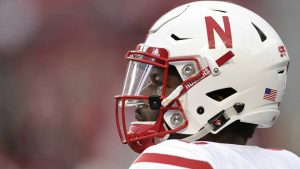
Tommy Armstrong will be playing his final few games as a Husker in the coming weeks. Many fans are wondering what lasting impact he will leave behind. Photo by SportingNews.com
In the sweltering early September heat, Tommy Armstrong Jr. lay on the sidelines against Oregon with an IV pumping into his wilting body. Moments later, that same person guides Nebraska on a game-winning drive and even scores the winning touchdown run to catapult the Huskers 2016 season.
Many weeks later, Armstrong is carted off to a Columbus hospital after being knocked unconscious, only to return to the sidelines to support his team in their defeat.
No matter what people will say about Armstrong years from now, his name will not go unmentioned without the term “competitor”.
Armstrong has proven over his many years at Nebraska that although he can make mistakes, he does not let them consume him. It is this passion and spirit that drove Armstrong to acrew multiple school records over his tenure.
When Tommy is on, he is on. Throwing for 66 career touchdowns and rushing for 23 so far, the stats only tell half the story. Armstrong has intangibles that are a rare commodity in the modern era of athletics.
Yes, he has had his fair share of interceptions and his mechanics seem relatively unimproved over the years but what price can you put on leadership?
After the anticlimactic rollercoaster that was Taylor Martinez, Lincoln was desperate for a quarterback revival. With Tommy Armstrong, Nebraska got a quarterback that only cared about results.
His impact is most greatly seen when Nebraska is without their field general.
In, 2015 when Armstrong was sidelined against Purdue in the middle of an already struggling campaign, the Cornhuskers failed to get what seemed a rollover win as backup Ryker Fyfe threw for 5 interceptions.
Before his injury against Ohio State, Armstrong was mounting a drive and building momentum; although maybe the Huskers would not have come out on top, his absence made an obvious indication that without him the game would not be close– and so it proved.
His ability to bounce back after failures and compete against the odds is unprecedented and emulates Husker players of old. So what will his legacy be?
In truth, the memories of the wayward passes and wrong decisions in the passing game may or may not circle the memory of his career, but games like the wins against number 7 Michigan State, the Foster Farms Bowl, and Oregon will always rise to the top.
Although it is short, time is not up for Armstrong, and he still can dictate what the final word will be on him. If you think for a second he won’t go out swinging, you are sorrily mistaken.
Expect Armstrong to fight through the injuries of the remaining weeks and continue to find a way onto the field. This kid is tough, and he will remind you week in, week out.
In the end, we won’t look at him in the same regards as the Frosts, Crouches, or Fraziers of the past but we can sure credit him with putting us on a path to better the program. All things considered, we should look back at Armstrong as a player who faced a lot of adversity from injuries to coaching changes, and a player who never backed down from a challenge nor neglected his teammates.
When we look back on Armstrong we should look back on him as the player he is: a competitor willing to put it all on the line.